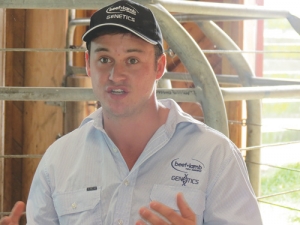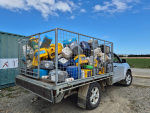So says Beef + Lamb New Zealand Genetics extension officer Max Tweedie.
"Vertical integration is really an opportunity in our industry and communication signals start from breeding and are delivered when the consumer eats the steak on the plate," Tweedie told the BLNZ annual meeting in Waitangi
"We have some really interesting research initiatives. The significance begins with the scale of projects. We've got some large commercial properties – iconic farms across NZ running beef research."
They are big trials, not studies. Tweedie says it enables BLNZ Genetics to qualify the value of EBVs (estimated breeding values) through the Australian owned system Breed Plan.
"That is significant because they see our breeding values as a number, as something that is put together, and we are now able to quantify those through some of our projects that they in fact translate to value on farm," he says.
They are able to contribute to the Breed Plan system for the first time.
"Commercially we have never had that input, so we have been able to go from being a service purchaser to being able to pull some strings.... That's allowed us to better describe the NZ beef industry."
Tweedie says Australians aren't as familiar with what we perceive as elasticity and as maternal performance. They have a different picture of what that is. NZ is out there to describe that through these trials.
The first project is the beef progeny test across five iconic farms in NZ and 2000 cows. The farms are Whangara (Angus, Simmental), Rangitaiki Station (Angus, Stabilizer, Simmental; Landcorp) Tautane Station (Angus; Taratahi), Mendip Hills (Hereford, Charolais; Black family); and Caberfeidh (Angus; Lone Star).
The trial starts with collecting information on calves born from a variety of sires used as crossbreeds from the North and South islands.
"We do DNA parentage on these calves, we see how heavy they are at weaning, we follow them through and collect ultrasound carcase scanned information from them and we also collect raw data in the abattoir which is a significant part of that.
"It also allows us to follow the heifer calves born and look at them on commercial properties."
Another project is the dairy beef progeny test with 800 cows at Limestone Downs at Port Waikato.
"That has only been Hereford Angus in the first year; we a looking to expand that and see what the opportunity is. It is to give dairy farmers peace of mind in calving using genetics in the beef industry. They don't believe it is possible."
It is also to deliver a product to the dairy industry which provides more value in fattening up, an issue a lot of people consider important, he says.
The other project is the maternal beef project. They are collecting condition scores on about another 2000 cows on commercial farms three times a year. They compare weight of calf to weight of cow.
"At this stage we don't know if a lean cow that retains that level of condition across the year weans a good calf; and those cows that retain their condition -- whether they are weaning top performing calves either.
"We know anecdotally there might be some trends, but we want to put this objectively into the evaluation system."
The project's significance is its contribution towards new trait development. Currently in NZ the mature cow rate as an EBV is a trait that describes the weight of a cow "which is a pretty poor way to describe efficiency", Tweedie says.
"We want to combine body condition score. You can have a cow at 600kg at a frame score of 5.0 or you can have a frame score of 7.0 at 600kg. One will be as fat as hell and one will be lean. To better describe the weight of that cow and her efficiency for her frame we would like to combine body condition score."
The data will contribute to new or improved traits for body condition score, mature cow weight and also for cow efficiency, longevity and fertility.
BLNZ Genetics has a trait called 'Daisy cow' and it is the only EBV trait that describes fertility. It says females that conceive early and continue to do so over their lifetimes are more productive and fertile.
"We know they will wean earlier heavier calves as a rule and we can identify they are correlated to be more fertile."
BLNZ Genetics is looking at heifer puberty and what stage relative to their age they become pubescent, and at the anthropological count to see how fertile these females are, whether they are going to be more productive over their lifetimes and whether selection decisions can be made earlier to make our herds more fertile. Tweedie says 82% national calving in beef cows isn't good enough.
Another significant factor is carcase traits.
"When we look at our progeny we are looking at the first-ever raw data from abattoir collection." Ultra-scanning for rib and rump fat are useful measures to show up genetic differences in animals, he says. But they are only predictions and correlations."
But recording these traits visually at abattoirs and putting them into the evaluation system can show farmers what the value is in increased carcase weight rather than a predictor.
Better EBV predictors will lead to a premium in markets.
"So for developing markets in that space with Silver Fern Farms beef eating quality, this information is significant.
"Carcase traits are highly herdable,
they are easy to improve; we've just got to describe them better and give people better EBV predictors."
The next space is genomics: they have 2000 cows in the beef progeny tests, 2000 in the beef maternal project and 800 in the dairy beef project.
In all these calves they are collecting genotypes, they know DNA parenthood on all of them. With this large population size they can identify genes that underpin certain traits and use those genes to predict performance early.
"We can tell whether a fat calf in front of us will be a Ritchie McCaw or a club rugby player. We can tell early and that's important in the genetic gain and asserting NZ as a world player in genetics."
With 1800 calves annually from beef progeny, 1800 from maternal and 300 from dairy, that gives them 2900 annually. "Across four years that is a lot of calves. Statistically it is powerful and a great way to increase our genetic gain, hit those market premiums and describe a better cow so she weans a better calf and turns more on the bottom line."
BLNZ Genetics' first crop of data on weaning weights and on the beef progeny test calves will be available soon so farmer field days will be held across the country.



















